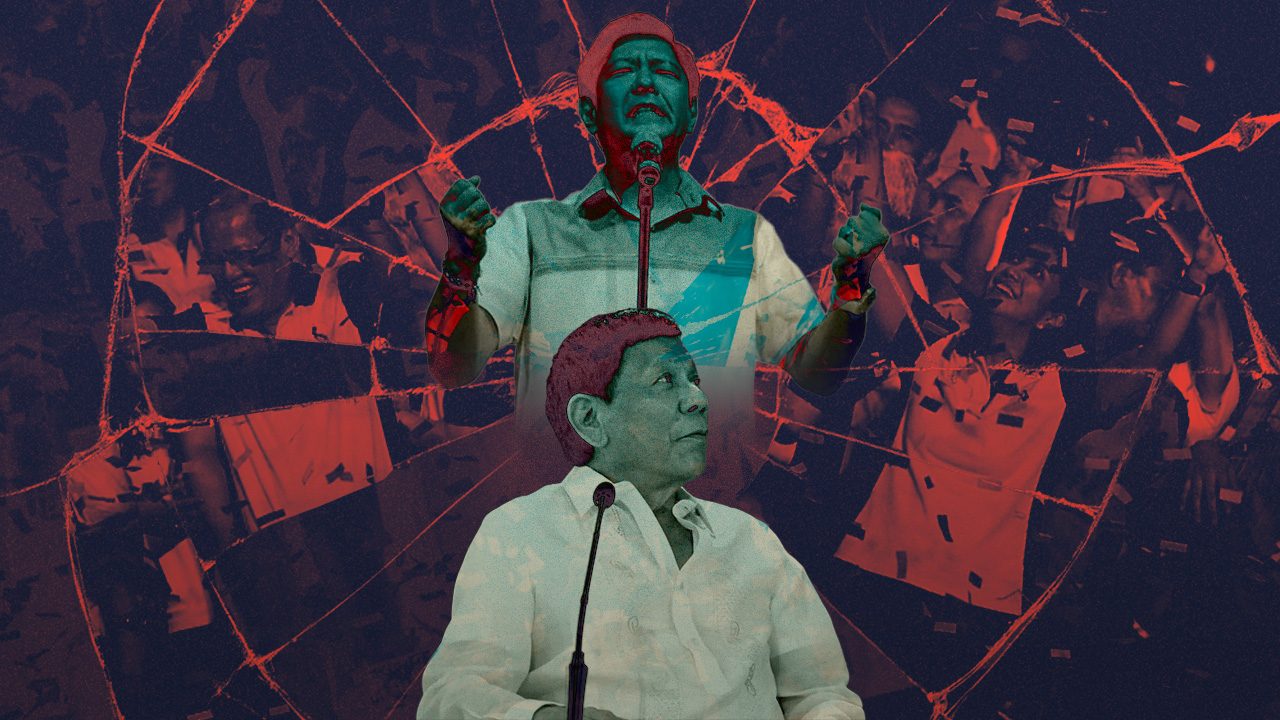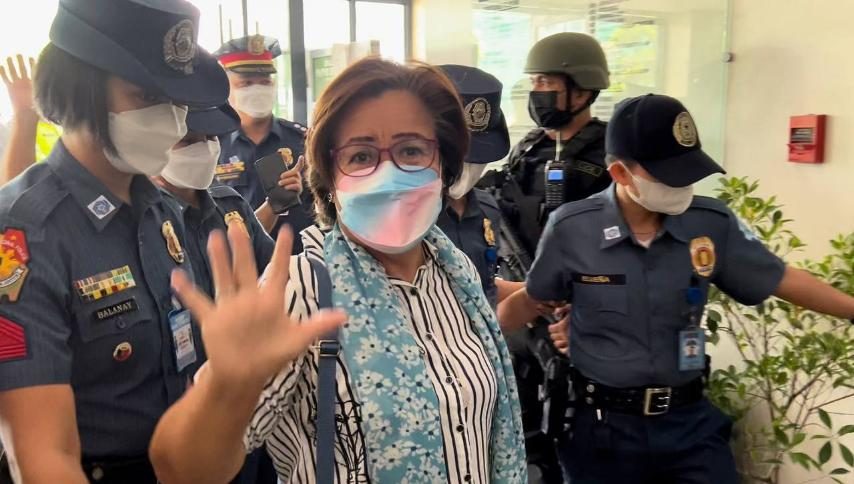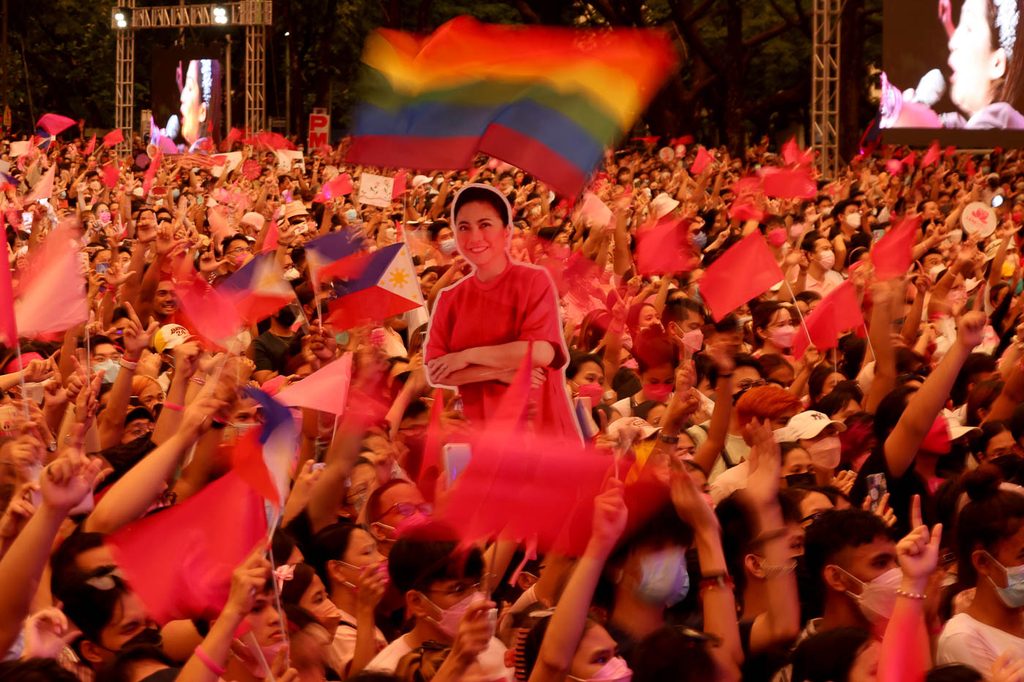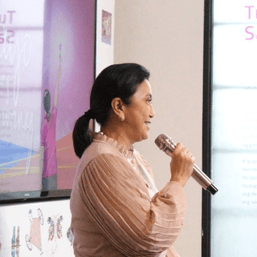SUMMARY
This is AI generated summarization, which may have errors. For context, always refer to the full article.

MANILA, Philippines – President Rodrigo Duterte is ending his term with an obliterated political opposition, a clear sign of Filipinos’ approval of his populist-authoritarian rule that has set the stage for the rise to power of his successor, Ferdinand “Bongbong” Marcos Jr.
Philippine opposition leader and outgoing Vice President Leni Robredo lost the 2022 presidential race. She ran on a people empowerment platform that aimed to rid the government of the old and rotten politics that has ruled for decades. But more than 31 million Filipinos would rather see the dictator’s family return to Malacañang instead.
Robredo’s momentum in the final weeks before the May 9 elections came a little too late. The volunteer-led “pink movement” that she inspired was no match to the six years of demonization that she and her allies in the once-ruling Liberal Party (LP) suffered at the hands of Duterte.
The rise of illiberal democracy in the Philippines further crippled the opposition, with no less than the President himself hammering on criticisms that his critics are elitists brandishing their “holier than thou” narrative on the masses.

The Duterte administration’s vast disinformation network boosted the President’s lies against opposition figures, with propagandists and trolls amplifying false information being spread about them – from supposed corrupt activities to alleged links to communist rebels.
The President weaponized the law and Congress, using legal instruments to justify moves to stifle critics. Duterte has also succeeded in packing both the House of Representatives and the traditionally independent Senate with his allies, who voted on bills and resolutions based on his wishes.
Incoming president Marcos stands to benefit from Duterte’s gains. The opposition has been left in shambles after Marcos managed to forge what some political pundits believe to be an even stronger ruling coalition with Duterte’s daughter Sara as the country’s vice president-elect.
It is a portrait of present-day Philippine politics when power and personalities trump principles, and most traditional politicians – Filipinos call them “trapo” – won’t dare stand up to a president as popular as Duterte or Marcos.
Former Ateneo School of Government (ASOG) dean Tony La Viña said that Duterte’s war against the opposition is nothing new, as his predecessors Gloria Macapagal-Arroyo and the late Benigno “Noynoy” Aquino III also made moves against their critics.
The difference was that Duterte did it better, with his brazen disregard for decency and the rule of law.
“In a way, we shouldn’t make a big deal out of the fact that the opposition was defeated by Duterte. It is the logical consequence of the political system that we have. Aquino did the same thing, Arroyo did the same thing for the House of Representatives, and for the local officials,” La Viña told Rappler. “But Duterte, obviously, did it better by being more ruthless. That’s really the difference.”
Stifling dissent
The Duterte government’s coordinated propaganda network became a powerful weapon against the opposition and all shades under it – the “yellows,” the progressives, and everything in between who dissented against the President’s abusive policies.
With his lies amplified online by propagandists, Duterte has turned “dilawan,” referring to the yellow color of LP, into a derogatory term to describe his critics – even if some of them do not even consider themselves liberals.
Online propaganda also helped shape public opinion about the former ruling party. A #FactsFirstPH study showed that the top targets of the Duterte disinformation network included current and former LP stalwarts: Aquino, Robredo, former interior secretary and 2016 presidential bet Mar Roxas, among others.
It came as no surprise then when candidates who ran under LP, or were known allies of the party, lost in the 2019 and 2022 elections.
In the 2019 midterm polls, only 18 LP candidates were elected in the House while all the senatorial bets of the LP-led Otso Diretso coalition lost.
The party fared worse in the 2022 elections – only 12 members clinched seats in the House and no LP candidate managed to win the senatorial race.
Reelected Senator Risa Hontiveros was the sole opposition candidate to secure victory. She belongs to Akbayan, a known close ally of LP.

“Illiberal democracy is a real, heavy challenge for us to engage in. Our Filipino values have been changing and they can continue to change. The values – not wars. The values struggle is one of the most important parts of our contested democracy,” Hontiveros said in her interview with Nobel laureate and Rappler CEO Maria Ressa. “We have to stay in the game. We have to name those values without judging or demeaning each other.”
LP’s negative branding was also Robredo’s unspoken burden as opposition leader, a title she did not fully embrace until sometime in the middle of Duterte’s term. Robredo later decided to seek the presidency as an independent candidate, in a bid to be seen as a more unifying figure for the opposition forces she tried but failed to unite.
Her running mate Senator Kiko Pangilinan, LP president, ran under the party’s banner. The Robredo-Pangilinan tandem, however, finished only in second place in their respective races in the 2022 polls.
This disinformation network also heavily targeted activists and progressive groups, with Duterte himself leading the charge in accusing them as fronts for the Communist Party of the Philippines (CPP).
Online disinformation focused on creating an environment that sought to enable and justify violence by branding activists as terrorists and exaggerating the communist threat.
Duterte operated to remove the Makabayan bloc party-list groups from Congress: Bayan Muna, Kabataan, ACT Teachers, Gabriela Women’s Party, and Anakpawis.
And slowly but surely, the President got what he wanted. In 2016, Makabayan had seven seats in Congress. In 2019, that was reduced to six, with Anakpawis losing its seat in the chamber. And in 2022, Makabayan lawmakers in the House are down to three, one each for Kabataan, ACT Teachers, and Gabriela.
Bayan Muna suffered its biggest loss in its two-decade history of participating in the party-list elections.

The opposition’s Achilles’ heel was its failure to recognize early on just how big the threat disinformation was to democracy.
Learning from the painful lesson of the past six years, Robredo has vowed to lead efforts to break the massive disinformation network on social media once she steps down as Vice President on June 30.
Weapons: Congress and law
As lies festered online and seeped into the Filipino psyche, Duterte and his government allies launched parallel attacks to clamp down on the opposition.
The President made an early example out of Senator Leila de Lima, his fiercest critic who, as then-chair of the Senate justice and human rights committee, probed into the spate of extrajudicial killings happening under Duterte’s bloody drug war just months after he took office in 2016.
It came with a hefty price: Duterte allies in the House turned the tables on De Lima and conducted their probe into the alleged proliferation of drugs inside the New Bilibid Prison when De Lima was justice secretary.
The House probe spiraled into a trial by publicity for De Lima, as lawmakers feasted on her alleged love affairs with her former staff members. Ex-House speaker Pantaleon Alvarez even considered publicizing De Lima’s alleged sex video. It was never released; its existence was never proven.
It wouldn’t take long for the Department of Justice (DOJ) to later file drug complaints against De Lima for supposedly receiving money from convicts in exchange for protection. She was arrested on February 24, 2017, and has stayed in jail ever since.

The Duterte regime targeted another female critic months later – former Supreme Court chief justice Maria Lourdes Sereno, who has clashed with Duterte multiple times.
Lawyer Larry Gadon filed an impeachment complaint against Sereno in the House, where the hearings exposed deep-seated grudges of several justices against Sereno. The House later voted to impeach her, but not before Solicitor General Jose Calida filed an unprecedented quo warranto petition with the SC seeking to void her appointment as chief justice.
Sereno’s impeachment trial in the Senate never happened, however, as the SC would later rule in favor of her ouster as chief justice in May 2018.
That same year, Duterte himself surprised even his own Cabinet when he issued Proclamation 572 to immediately revoke the amnesty granted to then-opposition senator Antonio Trillanes IV, a former rebel soldier who led the Oakwood mutiny in 2003 and the Manila Peninsula incident in 2007 during the Arroyo administration. Trillanes is one of Duterte’s staunchest critics.
But unlike De Lima, Trillanes managed to evade arrest as his fellow senators supported him in challenging Duterte’s “unconstitutional” revocation of his amnesty.
This was all thanks to the close relationships Trillanes built with his colleagues since he became a senator in 2007, coupled with the weak legal basis of Proclamation 572 and the public backlash Duterte received at the time.
The Court of Appeals (CA) later sided with Trillanes. He eventually gunned for a Senate comeback in 2022, but failed to enter the Magic 12.
The Duterte government’s offensive against the opposition did not end there.
In 2019, the police filed complaints of inciting to sedition, cyber libel, libel, and obstruction of justice against Robredo and 35 other key opposition figures and their staff, human rights lawyers, bishops and priests, and others over the viral videos of Peter Joemel Advincula, alias Bikoy, that linked Duterte and his family to the drug trade. The DOJ let most of them off the hook but charged 11 of the respondents, including Trillanes.

The President also went after former allies who put him or those close to him on the hot seat.
Senator Richard Gordon took over the Senate probe into the drug war when De Lima was removed as committee chairperson, and he exonerated Duterte from any wrongdoing.
But years later, it was also Gordon who led the Senate investigation into the anomalies hounding the multi-billion pandemic contracts cornered by Pharmally Pharmaceutical Corporation, the biggest corruption scandal to rock the Duterte presidency.
And for that, Gordon made himself an enemy of Duterte, who actively campaigned against him in the run-up to the 2022 polls.
Gordon lost his reelection bid. His draft report recommending cases to be filed against Duterte after his term was not acted upon by the Senate because his colleagues disagreed with the findings implicating Duterte in the Pharmally scandal.
Marcos’ ace and Leni’s NGO
Duterte virtually decimating the political opposition will be an ace for Marcos, who secured the first presidential win by a majority vote since the bloodless 1986 EDSA People Power Revolution that toppled his father.
With fewer people in the opposition, Marcos can easily implement his policies and pass his pet bills in Congress. Most local officials have already pledged loyalty to him.
Marcos’ cousin, Leyte 1st District Representative Martin Romualdez, is poised to become the next House Speaker, while his ally Senator Juan Miguel Zubiri is already a shoo-in for the Senate presidency.
“It benefits him because he will be able to consolidate Congress and local government to do whatever he wants, with very little opposition, without any dissent,” said La Viña. “Having no opposition means you are relatively free to pursue whatever you want to pursue.”

All hope isn’t lost though. The challenge is for a new opposition to rise under Marcos, one that is no longer rooted in the liberals whom Filipinos have rejected in the past three successive elections.
The coalition that Robredo formed in the 2022 campaign can be a good starting point, said ASOG senior research fellow Michael Yusingco. Robredo’s 15 million was not enough to propel her to the presidency, but it is still a critical mass that can spearhead genuine political reforms.
Robredo supporters, who were disheartened by the election results, were energized when she announced that she will be launching the Angat Buhay non-government organization, which she envisaged to be the “biggest volunteer movement” in Philippine history.
But Yusingco hopes it would go beyond NGO work and lay down the foundation needed to spark a political movement, if not a new political party.
“When I say it has to evolve into a political party, I don’t necessarily mean it has to compete in elections this early. What I mean is for the movement to fall into an institutional political structure so that the young people in this movement can engage in politics,” Yusingco told Rappler. “I would hope that they would participate in legislation, in policy-making, in making their voices heard as a political party, not necessarily as mere individuals or groups.”

La Viña agrees, adding that Robredo herself must play a crucial role in creating this new political movement. The outgoing Vice President, however, has yet to fully discuss what to expect about the Angat Buhay NGO. She also plans to return to development work when she steps down from office.
But for now, many of those in the opposition hold on to Robredo’s words when she accepted her electoral defeat – that the fight for good governance does not end in 2022. It has to go on, more than ever now.
“Uulitin ko po: Walang nasayang. Hindi tayo nabigo. Masasayang lang ang ating pinagsikapan kung titigil tayo at babalik sa dating kalakaran. Gaya ng sabi ko: Ang namulat, hindi na muling mapipikit,” said Robredo on May 13. “Kaya tara na. Ituloy na natin ang laban para sa Pilipinas na ating mga pangarap.”
(Let me repeat: Nothing was wasted. We did not lose. All our efforts would only go to waste if we stop now and go back to our old ways. As I’ve said: Those who have been awakened can no longer be blind. So come on. Let us continue fighting for the Philippines we are all dreaming of.) – Rappler.com
Add a comment
How does this make you feel?
![[In This Economy] Marcos’ POGO ban is popular, but will it work?](https://www.rappler.com/tachyon/2024/07/thought-leaders-marcos-pogo-ban.jpg?resize=257%2C257&crop=255px%2C0px%2C720px%2C720px)
![[Rappler Investigates] POGOs no-go as Typhoon Carina exits](https://www.rappler.com/tachyon/2024/07/newsletter-graphics-carina-pogo.jpg?resize=257%2C257&crop=424px%2C0px%2C1080px%2C1080px)





![[Newspoint] A fighting presence](https://www.rappler.com/tachyon/2024/07/thought-leaders-a-fighting-presence.jpg?resize=257%2C257&crop=441px%2C0px%2C1080px%2C1080px)
![[Closer Look] ‘Join Marcos, avert Duterte’ and the danger of expediency](https://www.rappler.com/tachyon/2024/06/TL-trillanes-duterte-expediency-june-29-2024.jpg?resize=257%2C257&crop_strategy=attention)


![[OPINION] Rodrigo Duterte and his ‘unconditional love’ for China](https://www.rappler.com/tachyon/2024/04/rodrigo-duterte-xi-jinping-august-2019.jpeg?resize=257%2C257&crop=91px%2C0px%2C900px%2C900px)
![[Vantage Point] China’s silent invasion of the Philippines](https://www.rappler.com/tachyon/2024/07/TL-china-silent-invasion-july-16-2024.jpg?resize=257%2C257&crop=318px%2C0px%2C720px%2C720px)

![[EDITORIAL] Ang ‘deep, deadly web’ ng POGOs](https://www.rappler.com/tachyon/2024/07/animated-pogos-chinese-crime-syndicate-carousel.jpg?resize=257%2C257&crop=280px%2C0px%2C720px%2C720px)



![[The Slingshot] Lito Patay’s 4 hours and 38 minutes of infamy](https://www.rappler.com/tachyon/2024/07/Lito-Patay-4-hours-infamy-July-19-2024.jpg?resize=257%2C257&crop=233px%2C0px%2C720px%2C720px)
There are no comments yet. Add your comment to start the conversation.